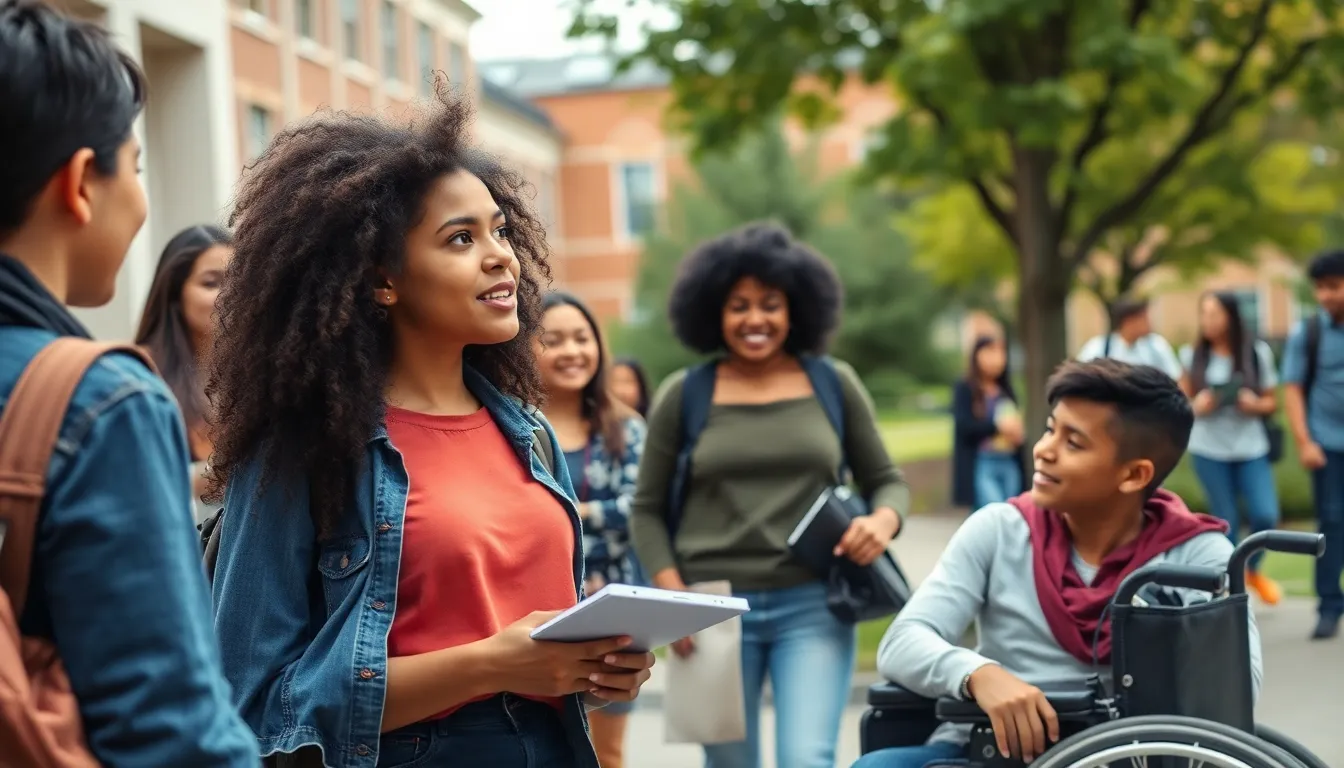Table of Contents
ToggleImagine a world where every student, regardless of their unique challenges, strides confidently onto a college campus. It sounds like a dream, right? But here’s the kicker: it’s not just a fantasy. Special education students can absolutely go to college, and they’re ready to take the academic world by storm.
Understanding Special Education
Special education ensures that students with disabilities receive appropriate educational opportunities. This approach cultivates an inclusive environment where all students can thrive.
Definition of Special Education
Special education refers to tailored instructional methods and resources designed for students with disabilities. This education aims to meet the unique needs of each learner. Services include individualized education programs (IEPs), specialized teaching strategies, and adaptive technologies. Such supports empower students to achieve academic and personal success.
Types of Disabilities in Special Education
Various disabilities exist within the realm of special education. These include learning disabilities, which affect information processing. Physical disabilities impact mobility and necessitate adaptive tools. Emotional and behavioral disorders influence social interactions and emotional well-being. Additionally, intellectual disabilities affect cognitive functioning. Autism spectrum disorders present unique challenges in communication and behavior. Understanding these disabilities aids educators and families in providing effective support. Each type of disability requires specific interventions tailored to enhance the educational experience.
The College Experience for Special Education Students

Special education students encounter unique opportunities and obstacles in their college journeys. Many institutions now prioritize inclusivity, aiming to accommodate diverse learner needs.
Benefits of College Education
Higher education empowers special education students with valuable skills. Academic environments foster independence and self-advocacy, enhancing personal growth. Social connections form as students engage with peers, cultivating relationships that support emotional well-being. Resources like tutoring and mentoring offer tailored academic support. Graduating from college often leads to improved job prospects and economic stability.
Challenges Faced by Special Education Students
Navigating college presents specific challenges for special education students. Adjusting to the academic rigor can prove daunting without appropriate support. Social integration also poses difficulties, as some students may struggle to connect with peers. Limited awareness or resources from institutions can hinder access to essential accommodations. Additionally, teachers and staff may lack training in recognizing and addressing the unique needs of these students, impacting overall success.
Resources and Support Systems
Various resources and support systems are vital for helping special education students thrive in college. These systems help students navigate the unique academic challenges they face.
Academic Support Services
Academic support services provide essential assistance tailored to individual needs. Many colleges offer tutoring programs, workshops, and mentoring for special education students. Disability services offices play a crucial role in coordinating accommodations, such as extended exam time or note-taking assistance. They also connect students with academic advisors trained in special education requirements. Utilizing these services enables students to maintain their academic performance and develop effective study habits.
Financial Aid Opportunities
Financial aid opportunities are available to make college more accessible for special education students. Scholarships specifically designed for individuals with disabilities exist, including those from private organizations and foundations. Federal and state financial aid programs also offer support. Special education students can apply for grants that consider their unique circumstances. Understanding these financial resources enhances the ability of students to manage the costs of college.
Legal Protections and Rights
Legal protections and rights significantly impact special education students pursuing higher education. Understanding these laws helps students access necessary resources and accommodations.
Individuals with Disabilities Education Act (IDEA)
The Individuals with Disabilities Education Act ensures students with disabilities receive a free appropriate public education. Under IDEA, students are entitled to individualized education programs that address their specific needs. This law emphasizes collaboration between educators, parents, and students, fostering a supportive learning environment. IDEA also guarantees that students can transition from secondary education to postsecondary settings, ensuring their rights persist even in college. Colleges must recognize prior learning and accommodations established under this act, aiding students in their academic journey.
Americans with Disabilities Act (ADA)
The Americans with Disabilities Act provides critical protections against discrimination for individuals with disabilities. This law mandates equal access to all public and private higher education institutions. Under the ADA, colleges must provide reasonable accommodations, such as extended test time or alternative formats for materials. Students with disabilities can request these accommodations without fear of repercussions. Compliance with ADA creates an inclusive environment that focuses on the diverse needs of students, enhancing their college experience. Understanding these rights empowers students and fosters self-advocacy as they navigate their educational pathways.
Special education students have every opportunity to thrive in college environments that embrace inclusivity and support. With tailored resources and legal protections in place, these students can navigate academic challenges while developing essential skills for independence. As institutions continue to prioritize accessibility and understanding, the pathway to higher education becomes increasingly attainable. The journey may come with obstacles, but the potential for personal and professional growth remains significant. By fostering a culture of acceptance and support, colleges can empower special education students to achieve their dreams and contribute meaningfully to society.




